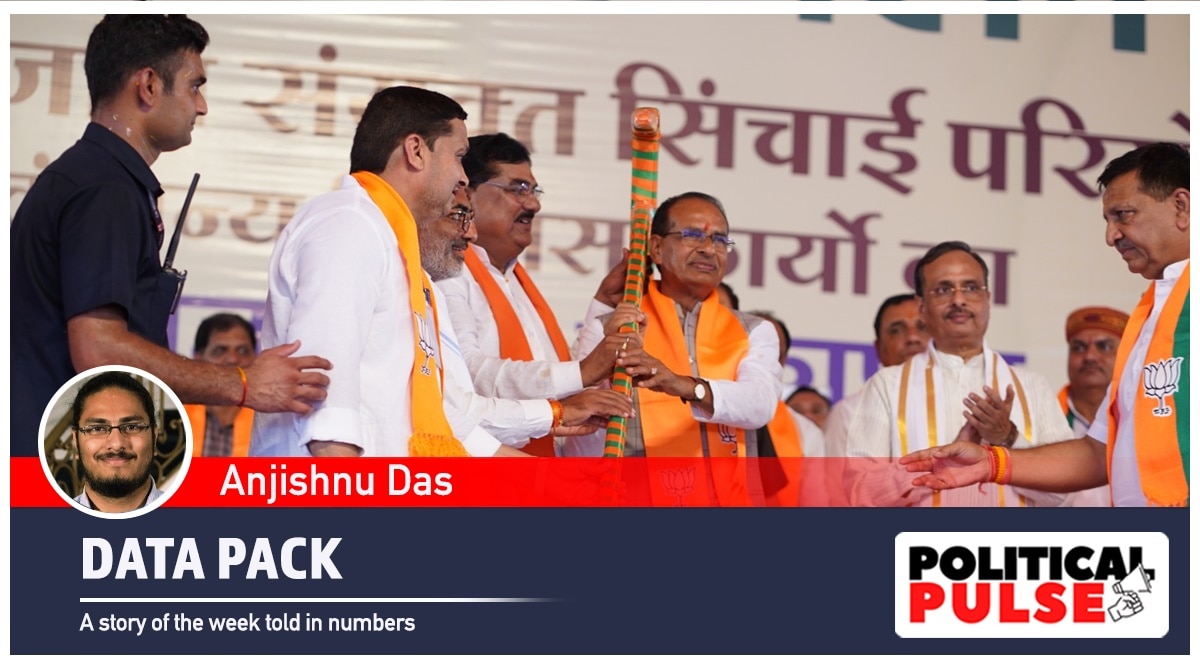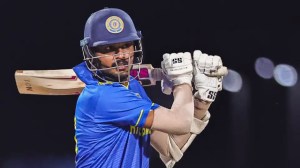Madhya Pradesh polls: BJP dominance since 2003, and Congress slowly chipping away
BJP's win in 2013 was big, with the party returning to power with more seats, vote share. In 2018, it saw a slide, but the fact that only 0.1% votes separated it from Congress, after 15 yrs in power, showed its hold on the state
 Madhya Pradesh CM Shivraj Singh Chouhan while campaigning for the upcoming state polls. (Photo: X@ChouhanShivraj)
Madhya Pradesh CM Shivraj Singh Chouhan while campaigning for the upcoming state polls. (Photo: X@ChouhanShivraj) The Election Commission is in the final stages of assessing preparations in the five poll-bound states, with the poll schedule expected to be announced any time now.
In Madhya Pradesh, recent elections have seen a direct contest between the BJP and the Congress. The ruling BJP, in an attempt to steal a march on its rivals, has already announced candidates in the seats it lost in the 2018 elections, and where it expects a tough fight – including bringing in central leaders into the state contest to shake up the political scene. Prime Minister Narendra Modi has stepped up his visits to the state, including on Thursday, to announce and inaugurate development projects.
The Congress, which is yet to announce candidates, will be hoping to better its good 2018 performance, when it had emerged as the single largest party and formed the government with support from the Bahujan Samaj Party, Samajwadi Party and Independents to end 15 years of BJP rule. However, just over a year later, Congress leader Jyotiraditya Scindia had switched to the BJP along with 22 Congress MLAs, bringing the Kamal Nath government down, and returning the BJP’s Shivraj Singh Chouhan as Chief Minister for a fourth time – making him the longest-serving CM of the state.
As parties sharpen their poll pitch, also with an eye on the Lok Sabha polls next year, here’s a look at how Madhya Pradesh has voted in recent elections.
Parties and past four polls
The BJP has not been out of power in Madhya Pradesh since 2003, barring the little time after the 2018 elections. Chouhan became the CM in 2005, taking over from Babulal Gaur as CM after the BJP’s victory in the 2003 elections. While the BJP lost some ground from 2003 to 2008, in 2013, the party led by Chouhan won by both a bigger seat tally and vote share. Though the Congress’s vote share rose in 2013, it won fewer seats than it did in 2008.
But 2018 was a different story. The Congress put up a stiff fight against the BJP, matching the saffron party’s vote share and just falling short of the majority mark. The BJP lost its first Assembly poll in MP since 1998, though it went on to return to power through defections in 2020.
2003 Polls
A BJP win in these elections, the first after Chhattisgarh was carved out of MP, ended 10 years of Congress rule under CM Digvijaya Singh. The BJP contested 230 seats and won 173, with Uma Bharti becoming the CM. The Congress, SP and BSP won 38, 7 and 2 seats, respectively. The Congress contested in 229 seats, the SP in 161 and the BSP in 157. The tribal-based Gondwana Gantantra Party (GGP) won 3 of the 61 seats it contested.
Of the state’s 34 Schedule Caste (SC) seats, the BJP won 30, Congress 3 and SP 1. Of the 41 Scheduled Tribes (STs), the BJP won 37, and Congress and GGP 2 each.
2008 Polls
The Congress, whose 2003 performance would go on to be its worst for the next 20 years, managed a modest recovery of 33 seats in 2008, but it wasn’t enough to deny the BJP a clear majority, despite the saffron party’s seat tally dropping by 30 and vote share by 5% points. Chouhan, who had become CM towards the end of the previous BJP government’s tenure, was given the top post once again for his first full term.
Three parties contested 228 of the 230 seats – the BJP, Congress and then Uttar Pradesh CM Mayawati’s BSP, with the BJP winning 143 seats, the Congress 71, BSP 7 and Samajwadi Party 1. Aside from pockets of Congress influence in the western Malwa and northern Gird regions, the BJP’s dominated in the rest of the state.
These polls were notable for the debut of the Bharat Jan Shakti Party (BJSP), formed by ex-CM Bharti, a firebrand Hindutva leader ousted by the party over “indiscipline” in 2005. But while it was expected to cut into the BJP’s vote share, the BJSP that contested in 201 seats won only 5, securing just 4.7% of the votes. In 2011, Bharti returned to the BJP fold and disbanded her party.
Of the state’s 35 SC seats, the BJP won 25 and Congress 9. The contest was closer in the 47 seats reserved for STs – the BJP won 29 and Congress 17.
After the Congress’s second consecutive loss, its former two-time CM Digvijaya Singh resolved not to contest polls for the next decade, leaving former Union minister Suresh Pachouri to lead the party.
2013 Polls
The 2013 election win was a big boost for Chouhan and the BJP as the party returned to power with more seats and vote share compared to 2008. The party was dominant in most of the state’s regions, including Malwa and Gird, though the Congress was close in the northeastern Baghelkhand region, which shares borders with UP. The BJP also strengthened its hold in the central Vindhya Pradesh region.
The BJP won 165 seats, followed by the Congress at 58 and the BSP at 4. The parties contested 230, 229 and 227 seats, respectively. The SP failed to win any of the 164 seats it contested.
Among SC seats, the BJP improved its tally to 28, with the Congress dropping to 4, and the BSP winning 3. The BJP also won 31 ST seats, with 15 of the remaining seats going to the Congress and 4 to Independents.
All the top BJP leaders, Chouhan, Babulal Gaur and Kailash Vijayvargiya won. The party was able to rely on perennial MLA and senior state Cabinet minister Gopal Gaurav, in office since 1985, and Gwalior royal Yashodhara Raje Scindia. Though he lost, the BJP had also fielded Anoop Mishra, the nephew of former PM Atal Bihari Vajpayee.
Though the Congress’s vote share rose by almost 5%, its seat tally fell by 13 compared to 2008. While Pachouri was unable to retain his seat, among the notable Congress winners were Jaivardhan Singh, who contested from the seat vacated by his father Digvijaya Singh, and Ajay Singh, the son of former Madhya Pradesh CM and Union minister Arjun Singh.
Kamleshwar Patel, who has risen to prominence after his surprise appointment to the reconstituted Congress Working Committee this year, won his first Assembly poll in 2013.
2018 Polls
The elections ended in a hung Assembly, though the Congress was the single largest party. The party nearly doubled its seat tally from 2013, at the cost of the BJP, and its vote share rose by over 4% points, putting the difference in the vote share of the two parties at 0.1%, one of the narrowest gaps on record.
Malwa and the north-central Bundelkhand were among the most hotly contested regions. While the Congress was the clear winner in the Gird, the BJP was dominant in Baghelkhand region and the Bhopal division.
The Congress cut into the BJP’s reserved seat tally considerably. The BJP was reduced to 18 SC seats and 16 ST seats, while the Congress secured 17 SC seats and doubled its ST seat tally to 30.
The Congress’s efforts in 2018 were led by former Union minister and nine-time Lok Sabha MP Kamal Nath, who later won a bypoll to become the CM. Though some high-profile candidates like Pachouri and Ajay Singh lost, state unit co-chairman Jitu Patwari, Jaivardhan Singh and Sachin Yadav, son of former deputy CM Subhash Yadav, were among the winners.
Several sitting BJP ministers lost their seats. The party’s notable winners, aside from Chouhan who defeated former Congress Union minister of state Arun Subhashchandra Yadav, included Yashodhara Raje Scindia for a second consecutive term, Uma Bharti’s nephew and first-time contestant Rahul Singh Lodhi, and Vijayvargiya’s son Akash. With Vijayvargiya now among central leaders to be fielded in the state fight, the fate of Akash is uncertain.
Beyond BJP, Cong
In 2018, only 2 of the BSP’s 227 candidates won. The SP contested far fewer seats this time but only 1 of its 52 candidates won. The Aam Aadmi Party made its poll debut in the state but failed to make an impact despite contesting in 208 seats.
The BSP and SP have been players in the state, but only marginally. However, in 2018, they won enough for the Congress to turn to them to form the government. For 2023, the BSP is allying with the Gondwana Gantantra Party in an attempt to win the reserved seats. SP chief Akhilesh Yadav said earlier this week that he wants the party to “fight together” with INDIA bloc partner Congress in Madhya Pradesh.
The AAP, another INDIA bloc member, has announced it will contest this time too. So far, it has named 39 candidates. The party may announce more candidates and it remains unclear if it will seek an alliance with the Congress or the SP.
Lok Sabha polls
Its 2018 Assembly loss notwithstanding, the BJP won 28 of the state’s 29 Lok Sabha seats in 2019. In terms of Assembly segments, the BJP won 208 in the 2019 polls – riding on a Narendra Modi wave – and the Congress 22.
- 01
- 02
- 03
- 04
- 05































